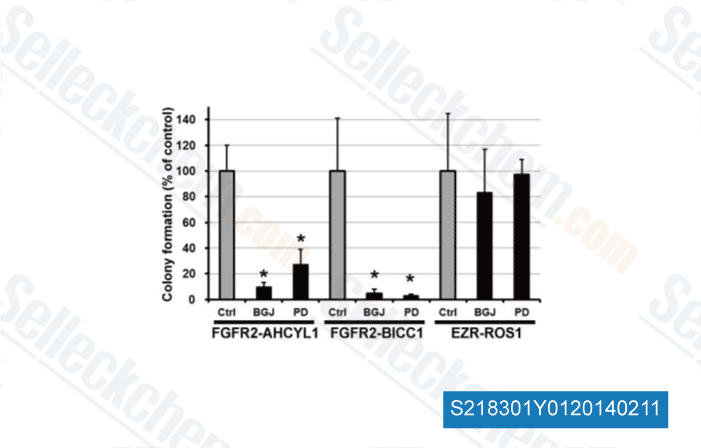|
Toll Free: (877) 796-6397 -- USA and Canada only -- |
Fax: +1-832-582-8590 Orders: +1-832-582-8158 |
Tech Support: +1-832-582-8158 Ext:3 Please provide your Order Number in the email. |
Technical Data
| Formula | C26H31Cl2N7O3 |
|||
| Molecular Weight | 560.48 | CAS No. | 872511-34-7 | |
| Solubility (25°C)* | In vitro | DMSO | 1 mg/mL (1.78 mM) | |
| Water | Insoluble | |||
| Ethanol | Insoluble | |||
|
* <1 mg/ml means slightly soluble or insoluble. * Please note that Selleck tests the solubility of all compounds in-house, and the actual solubility may differ slightly from published values. This is normal and is due to slight batch-to-batch variations. * Room temperature shipping (Stability testing shows this product can be shipped without any cooling measures.) |
||||
Preparing Stock Solutions
Biological Activity
| Description | Infigratinib (BGJ398) is a potent and selective FGFR inhibitor for FGFR1/2/3 with IC50 of 0.9 nM/1.4 nM/1 nM in cell-free assays, >40-fold selective for FGFR versus FGFR4 and VEGFR2, and little activity to Abl, Fyn, Kit, Lck, Lyn and Yes. Phase 2. | ||||||||||
|---|---|---|---|---|---|---|---|---|---|---|---|
| Targets |
|
||||||||||
| In vitro | BGJ398 also prevents VEGFR2 with low potency. The IC50 of BGJ398 for inhibiting VEGFR2 is 0.18 μM. BGJ398 suppresses other kinases including ABL, FYN, KIT, LCK, LYN and YES with IC50 of 2.3 μM, 1.9 μM, 0.75 μM, 2.5 μM, 0.3 μM and 1.1 μM, respectively. At the cellular level, BGJ398 inhibits the proliferation of the FGFR1-, FGFR2-Q, and FGFR3-dependent BaF3 cells with IC50 of 2.9 μM, 2.0 μM and 2 μM, respectively. BGJ398 interferes with autophosphorylation on specific tyrosine residues including FGFR-WT, FGFR2-WT, FGFR3-K650E, FGFR3-S249C and FGFR4-WT with IC50 of 4.6 nM, 4.9 nM, 5 nM, 5 nM and 168 nM, respectively. BGJ398 suppresses proliferation of the cancer cells with wild-type (WT) FGFR3 overexpression such as RT112, RT4, SW780 and JMSU1 with IC50 of 5 nM, 30 nM, 32 nM and 15 nM, respectively. [1] | ||||||||||
| In vivo | In this orthotopic xenograft bladder cancer model, BGJ398 induces tumor growth inhibition and stasis after oral administration for 12 consecutive days at the doses of 10 and 30 mg/kg, respectively. Interestingly, the animals that received BGJ398 exhibits either no body weight loss (10 mg/kg) or 10% body weight gain (30 mg/kg), a further indication of efficacy. RT112 tumor-bearing and female Rowett rats receive a single oral administration of the monophosphate salt of BGJ398 at the doses of 4.25 and 8.51 mg/kg. BGJ398 significantly decreases the levels of pFRS2 and pMAPK in a dose-dependent manner. BGJ398 inhibits significantly bFGF-stimulated angiogenesis in a dose-dependent manner. However, BGJ398 does not impair VEGF-induced blood vessel formation. [1] |
Protocol (from reference)
| Kinase Assay: [1] |
|
|---|---|
| Cell Assay:[1] |
|
| Animal Study:[1] |
|
Customer Product Validation

-
Data from [Hepatology, 2014, 59(4), 1427-34]

-
Data from [Hepatology, 2014, 59(4), 1427-34]

-
Data from [Data independently produced by J Cell Physiol, 2014, 229(11), 1647-59]

-
, , Oncogene, 2017, 36(27):3831-3841
Selleck's Infigratinib (BGJ398) has been cited by 272 publications
| Decaying and expanding Erk gradients process memory of skeletal size during zebrafish fin regeneration [ bioRxiv, 2025, 2025.01.23.634576] | PubMed: 39896678 |
| Spatiotemporally resolved colorectal oncogenesis in mini-colons ex vivo [ Nature, 2024, 629(8011):450-457] | PubMed: 38658753 |
| Spatiotemporally resolved colorectal oncogenesis in mini-colons ex vivo [ Nature, 2024, 629(8011):450-457] | PubMed: 38658753 |
| Tet methylcytosine dioxygenase 2 (TET2) deficiency elicits EGFR-TKI (tyrosine kinase inhibitors) resistance in non-small cell lung cancer [ Signal Transduct Target Ther, 2024, 9(1):65] | PubMed: 38461173 |
| FGFR inhibition blocks NF-ĸB-dependent glucose metabolism and confers metabolic vulnerabilities in cholangiocarcinoma [ Nat Commun, 2024, 15(1):3805] | PubMed: 38714664 |
| Synergic activity of FGFR2 and MEK inhibitors in the treatment of FGFR2-amplified cancers of unknown primary [ Mol Ther, 2024, 32(10):3650-3668] | PubMed: 39033323 |
| Understanding and Overcoming Resistance to Selective FGFR inhibitors Across FGFR2-Driven Malignancies [ Clin Cancer Res, 2024, 10.1158/1078-0432.CCR-24-1834] | PubMed: 39226398 |
| Spatially distinct epithelial and mesenchymal cell subsets along progressive lineage restriction in the branching embryonic mammary gland [ EMBO J, 2024, 43(12):2308-2336] | PubMed: 38760574 |
| FGF receptor kinase inhibitors exhibit broad antiviral activity by targeting Src family kinases [ Cell Mol Life Sci, 2024, 81(1):471] | PubMed: 39621133 |
| Neuropeptides regulate embryonic salivary gland branching through the FGF/FGFR pathway in aging klotho-deficient mice [ Aging Cell, 2024, 23(12):e14329] | PubMed: 39239870 |
RETURN POLICY
Selleck Chemical’s Unconditional Return Policy ensures a smooth online shopping experience for our customers. If you are in any way unsatisfied with your purchase, you may return any item(s) within 7 days of receiving it. In the event of product quality issues, either protocol related or product related problems, you may return any item(s) within 365 days from the original purchase date. Please follow the instructions below when returning products.
SHIPPING AND STORAGE
Selleck products are transported at room temperature. If you receive the product at room temperature, please rest assured, the Selleck Quality Inspection Department has conducted experiments to verify that the normal temperature placement of one month will not affect the biological activity of powder products. After collecting, please store the product according to the requirements described in the datasheet. Most Selleck products are stable under the recommended conditions.
NOT FOR HUMAN, VETERINARY DIAGNOSTIC OR THERAPEUTIC USE.
